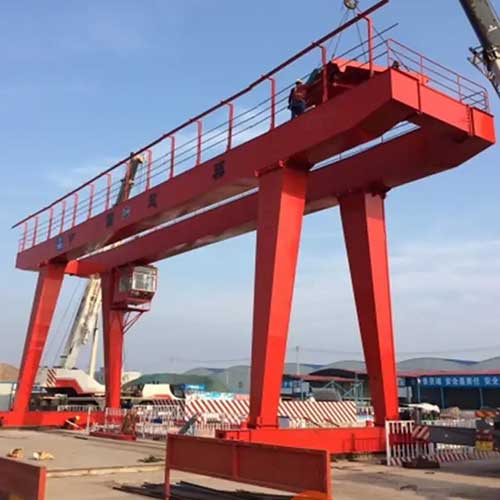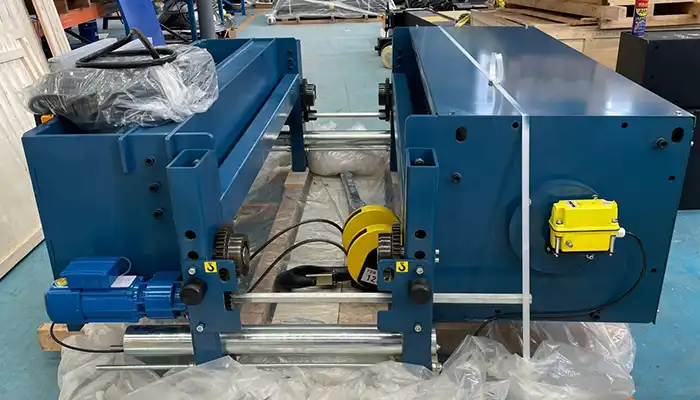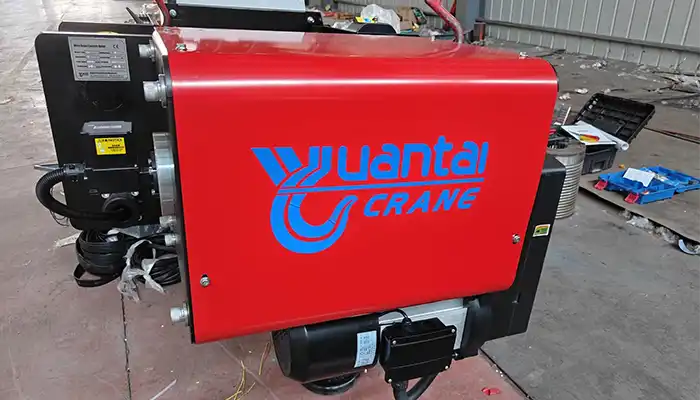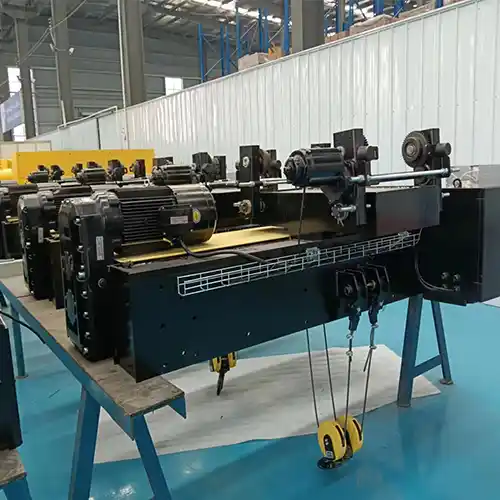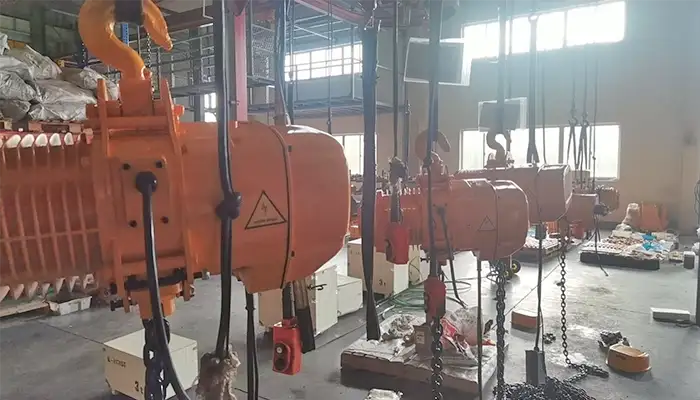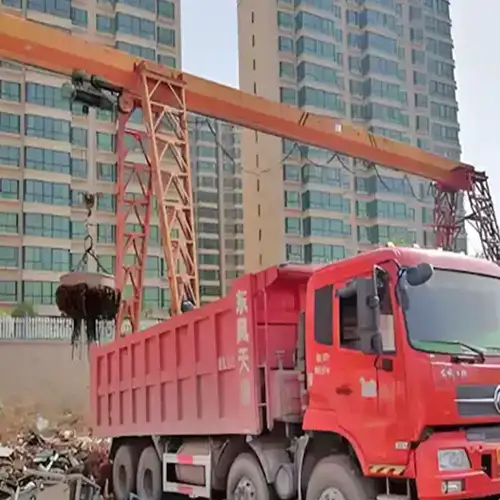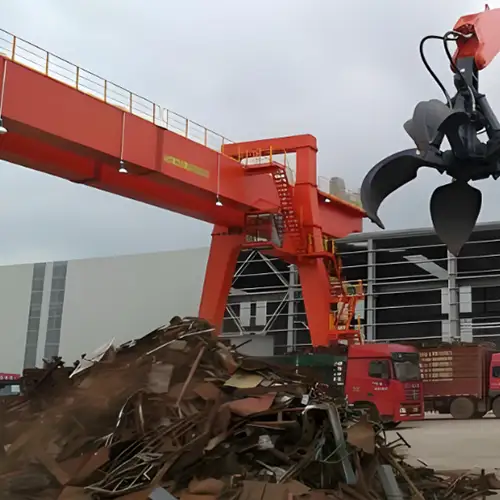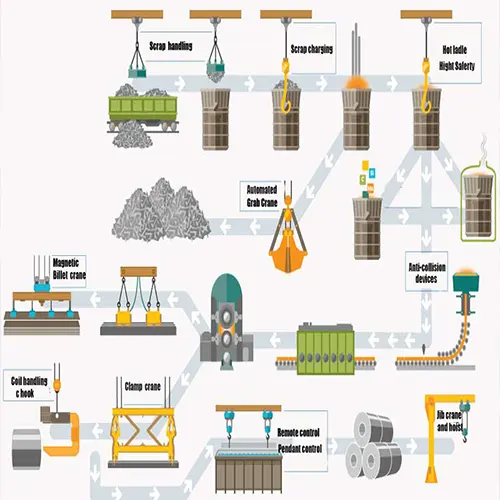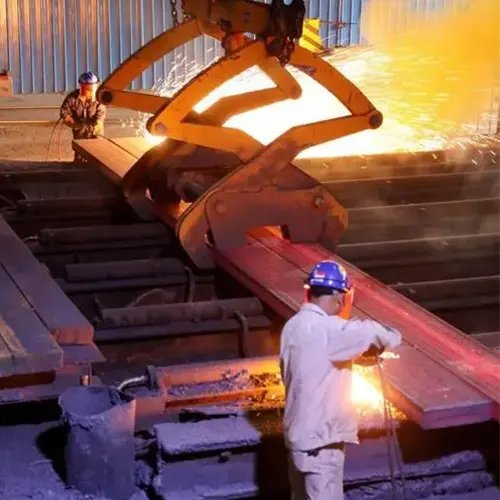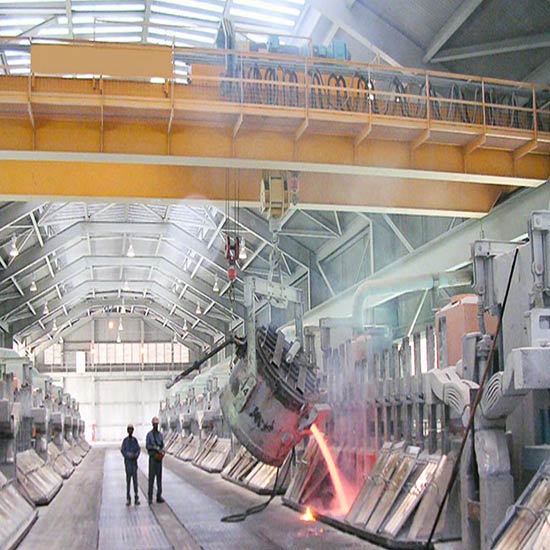Double Girder Gantry Cranes on Tracks Paving the Way in Steel Plants
20 tons to 100 tons double girder gantry cranes on tracks for handling steel coils, raw materials & heavy machinery parts in steel manufacturing plants & heavy industrial facilities.
Category: Steel
Your Trusted Crane on Tracks Manufacturer & Supplier
20 Tons to 100 Tons Double Girder Gantry Cranes on Tracks Paving the Way in Steel Plants
20 tons to 100 tons double girder gantry cranes on tracks for handling steel coils, raw materials & heavy machinery parts in steel manufacturing plants & heavy industrial facilities.
Steel Manufacturing with Double Girder Gantry Cranes
In the dynamic landscape of heavy industry, the role of advanced machinery becomes increasingly crucial. Among the stalwarts in this domain are Double Girder Gantry Cranes—engineering marvels designed to handle substantial loads with precision and efficiency. These cranes are characterized by their robust double-girder structure, providing enhanced stability and load-bearing capacity.
The significance of Double Girder Gantry Cranes lies in their ability to address the demanding requirements of heavy industrial settings. Their adaptability, coupled with the capability to handle diverse loads, positions them as indispensable assets across various industries. From steel manufacturing plants to other heavy industrial facilities, these cranes are reshaping the way materials are handled and processed.
In the sector of steel manufacturing, where precision and efficiency are paramount, Double Girder Gantry Cranes emerge as pivotal players. They navigate the intricacies of steel production, facilitating the seamless handling of steel coils, raw materials, and heavy machinery parts. As we delve deeper, we explore the specific applications and benefits that make these cranes an integral part of the steel production process.

box girder double girder gantry crane for steel mill coil handling
Typical Loads Handled
Steel Coils
- Importance in Steel Manufacturing :Steel coils are the lifeblood of steel manufacturing, serving as the primary raw material for a multitude of applications. These coils, often weighing several tons, are meticulously processed to form the backbone of various industries, from construction to automotive. The efficient handling of steel coils is paramount for a streamlined production process, making Double Girder Gantry Cranes an indispensable asset in steel plants.
- Challenges in Handling Steel Coils :The handling of steel coils presents unique challenges due to their considerable weight and unwieldy dimensions. Traditional handling methods can be time-consuming and prone to errors. Double Girder Gantry Cranes address these challenges by providing a stable and controlled lifting mechanism. The precision offered by these cranes ensures that steel coils are maneuvered seamlessly, reducing the risk of damage and optimizing the overall manufacturing workflow.
Raw Materials
- Types of Raw Materials :Steel manufacturing involves a diverse range of raw materials, each with its specific characteristics. From iron ore and coal to various alloys, the array of materials used requires a crane system capable of adapting to this diversity. Double Girder Gantry Cranes, with their versatile design, accommodate the handling of different raw materials, contributing to the flexibility and efficiency of the steel production process.
- Handling Requirements :Handling raw materials in a steel plant demands precision and reliability. The handling requirements vary from the delicate transport of alloys to the robust movement of bulk raw materials like iron ore. Double Girder Gantry Cranes are equipped with advanced control systems and customizable features, allowing them to meet the specific handling requirements of different raw materials. This adaptability ensures a smooth and efficient material flow within the steel plant.
Heavy Machinery Parts
- Nature of Heavy Machinery Parts :In the intricate ecosystem of a steel manufacturing plant, heavy machinery parts play a pivotal role. These components, often weighing several tons, are integral to the production and processing machinery. The timely and accurate placement of heavy machinery parts is critical for maintaining operational efficiency and minimizing downtime.
- Crane Specifications for Handling :Double Girder Gantry Cranes designed for handling heavy machinery parts boast robust specifications. These cranes are engineered with high load-bearing capacities, precise control systems, and specialized lifting attachments to ensure the safe and accurate placement of heavy machinery parts. The versatility of these cranes makes them adaptable to the varying shapes and sizes of components, contributing to the overall reliability of the steel manufacturing process.
As we unravel the intricacies of Double Girder Gantry Cranes in the context of steel manufacturing, we invite you to explore the transformative impact of these cranes on industrial operations. Stay tuned for insights into their role in steel plants and heavy industrial facilities in the upcoming sections of our RailCraft series.
Typical Crane Application
Overview of Steel Manufacturing Plants
- Structure and Operations :Steel manufacturing plants are complex ecosystems where precision and efficiency are paramount. These facilities typically comprise various sections, including raw material handling, smelting, casting, rolling, and finishing. The seamless coordination of these processes is essential for a smooth workflow and optimal production output.
- Material Handling Challenges : One of the central challenges in steel manufacturing plants lies in the efficient handling of materials throughout the production cycle. The movement of raw materials, semi-finished products, and heavy machinery parts demands a reliable and agile material handling system. Traditional methods may prove inadequate in addressing the scale and speed required in modern steel plants, leading to bottlenecks and increased production costs.
Role of Double Girder Gantry Cranes
- Streamlining Processes :Double Girder Gantry Cranes play a pivotal role in streamlining material handling processes within steel manufacturing plants. Their elevated structure, spanning the width of the plant, allows for the efficient movement of materials from one section to another. These cranes are particularly adept at handling heavy loads, ensuring a swift and precise transfer of steel coils, raw materials, and machinery parts.
- Enhancing Efficiency in Steel Plants : Efficiency is the cornerstone of success in steel manufacturing, and Double Girder Gantry Cranes contribute significantly to this goal. By minimizing downtime and optimizing material flow, these cranes enhance the overall efficiency of the plant. The advanced control systems and adaptability of Double Girder Gantry Cranes ensure a seamless integration with existing manufacturing processes, leading to increased productivity and cost-effectiveness.
Industrial Facilities Beyond Steel Plants
- Adaptability of Double Girder Gantry Cranes :The adaptability of Double Girder Gantry Cranes extends beyond the confines of steel manufacturing plants. These versatile cranes find applications in various heavy industries, including shipbuilding, aerospace, and automotive manufacturing. Their ability to handle a diverse range of materials and loads makes them a valuable asset in any industrial setting that requires precision and reliability in material handling.
- Diverse Applications in Heavy Industries : Beyond steel plants, Double Girder Gantry Cranes are employed in heavy industries where large and heavy loads need to be transported and positioned with accuracy. Whether it's lifting aircraft components in aerospace facilities or handling raw materials in shipyards, these cranes showcase their adaptability and reliability, underscoring their importance in the broader landscape of heavy industrial applications.
As we explore the versatility and impact of Double Girder Gantry Cranes, our RailCraft series continues to unveil the transformative role these cranes play in reshaping material handling practices across different industries. Stay tuned for further insights into the innovative applications and advancements in this critical realm of industrial technology.
Typical Tonnages Used
Range of Tonnages
- Minimum Tonnage (20 tons) :In the realm of Double Girder Gantry Cranes, the lower end of the tonnage spectrum is crucial for handling smaller loads with precision. The 20-ton minimum tonnage capacity is well-suited for tasks requiring finesse, such as the movement of lighter machinery parts or smaller batches of materials. This versatility allows these cranes to contribute to various aspects of material handling within industrial settings.
- Maximum Tonnage (100 tons) :At the upper echelon of capability, Double Girder Gantry Cranes boast a maximum tonnage capacity of 100 tons. This formidable lifting capacity is indispensable in steel manufacturing plants and heavy industrial facilities where large steel coils, massive machinery components, or substantial quantities of raw materials need to be handled. The robust design of these cranes ensures stability and reliability even when dealing with the heaviest loads.
Tonnage Selection Factors
- Nature of Materials Handled :The selection of the appropriate tonnage for a Double Girder Gantry Crane is contingent upon the nature of the materials it will handle. Delicate or precision components may require a crane with a lower tonnage capacity to ensure gentle handling. Conversely, the movement of large steel coils or heavy machinery parts necessitates a crane with a higher tonnage capacity to guarantee safe and efficient material handling.
- Plant Layout and Space Constraints :The layout and spatial constraints of a steel manufacturing plant or industrial facility play a pivotal role in tonnage selection. In confined spaces, a crane with a lower tonnage may be more maneuverable and suitable, ensuring it can navigate through tight areas without compromising efficiency. Conversely, in more expansive facilities with ample space, a higher tonnage crane may be employed to maximize load-carrying capabilities and expedite material movement.
The careful consideration of these tonnage selection factors is crucial for optimizing the performance of Double Girder Gantry Cranes within specific industrial contexts. The versatility in tonnage options allows for tailored solutions, ensuring that these cranes seamlessly integrate into diverse environments, addressing the unique demands of each industrial setting.
As our exploration of RailCraft and Double Girder Gantry Cranes continues, we delve into the intricate details that make these cranes indispensable in reshaping material handling practices across different industries. Stay tuned for further insights into the innovative applications and advancements in this critical realm of industrial technology.
Conclusion
In summary, the role of Double Girder Gantry Cranes in industrial settings, particularly in steel manufacturing, is nothing short of transformative. These cranes, with their robust design and versatile capabilities, serve as the backbone of material handling processes. From delicately managing smaller loads to efficiently lifting massive steel coils, they contribute to the seamless flow of materials within industrial facilities.
The importance of Double Girder Gantry Cranes in enhancing industrial operations cannot be overstated. Their precision, adaptability, and high load-bearing capacities lead to increased efficiency, reduced downtime, and optimized workflows. By addressing material handling challenges in steel manufacturing plants and other heavy industries, these cranes play a vital role in elevating overall operational performance.
In conclusion, the evolution of RailCraft and Double Girder Gantry Cranes exemplifies a commitment to innovation and efficiency in industrial settings. Their impact on steel manufacturing and heavy industries is not only evident today but also sets the stage for a future where precision and productivity seamlessly converge. As industries evolve, the role of these cranes will likely become even more pivotal, heralding a new era of efficient and streamlined material handling practices.
Main Projects
Related Products
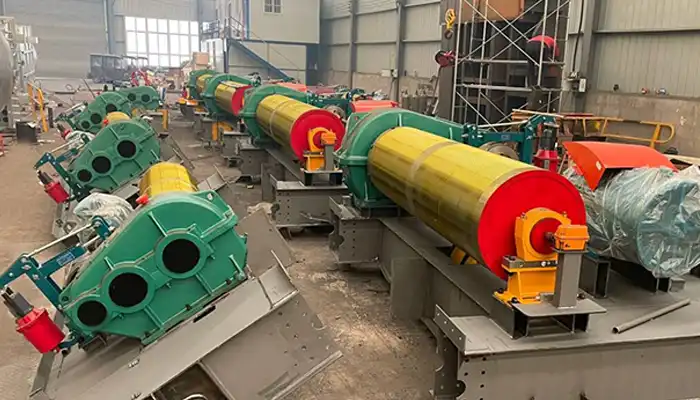
Latest project
32/5 Ton Overhead Crane Sale in India: Case Study
Free consultation to Confirm Parameters & Specifications and Get
Latest Crane Price & Crane Rate.
- Types of overhead cranes : _______?
- Optional: Overhead travelling crane, goliath gantry crane,Slewing jib crane, Single girder or double girder crane,small portable crane or kbk crane, etc.
- Capacity of overhead crane: _______?
- Optional: 0.25ton, 0.5 ton, 1 ton, 2 ton, 3ton, 5 ton, 10 ton,15ton, 20ton, 25 ton, 30ton,35ton, up to 550ton, etc.
- Crane span & lifting height : _______?
- Crane travelling length : _____?
- Control of overhead crane:_______?
- Optional: pendant/ remote/cabin control
- Voltage supply of overhead crane:_____?
- Eg,: 380V50/60HZ,3Phase or others,etc.
- Application/usage of crane:_______?
- Eg,: Steel mill, ,injection mold, cement,stone, concrete,granite, general manufacturing, etc.
Just leave a message via the contact form and our hoist and crane engineer will contact you with in 24working hours.
Get In Touch
